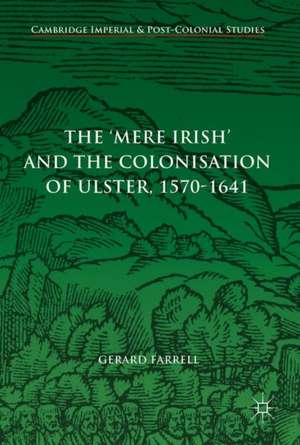The 'Mere Irish' and the Colonisation of Ulster, 1570-1641: Cambridge Imperial and Post-Colonial Studies
Autor Gerard Farrellen Limba Engleză Hardback – 23 oct 2017
| Toate formatele și edițiile | Preț | Express |
|---|---|---|
| Paperback (1) | 632.97 lei 38-44 zile | |
| Springer International Publishing – 23 aug 2018 | 632.97 lei 38-44 zile | |
| Hardback (1) | 737.12 lei 6-8 săpt. | |
| Springer International Publishing – 23 oct 2017 | 737.12 lei 6-8 săpt. |
Din seria Cambridge Imperial and Post-Colonial Studies
- 18%
 Preț: 894.46 lei
Preț: 894.46 lei -
 Preț: 280.10 lei
Preț: 280.10 lei - 20%
 Preț: 755.46 lei
Preț: 755.46 lei - 18%
 Preț: 774.83 lei
Preț: 774.83 lei - 18%
 Preț: 733.78 lei
Preț: 733.78 lei -
 Preț: 389.88 lei
Preț: 389.88 lei -
 Preț: 381.21 lei
Preț: 381.21 lei -
 Preț: 196.85 lei
Preț: 196.85 lei - 17%
 Preț: 491.68 lei
Preț: 491.68 lei -
 Preț: 386.10 lei
Preț: 386.10 lei - 15%
 Preț: 644.18 lei
Preț: 644.18 lei - 18%
 Preț: 782.87 lei
Preț: 782.87 lei -
 Preț: 389.70 lei
Preț: 389.70 lei - 15%
 Preț: 640.37 lei
Preț: 640.37 lei - 15%
 Preț: 500.73 lei
Preț: 500.73 lei -
 Preț: 396.40 lei
Preț: 396.40 lei -
 Preț: 390.63 lei
Preț: 390.63 lei - 15%
 Preț: 642.03 lei
Preț: 642.03 lei -
 Preț: 387.96 lei
Preț: 387.96 lei -
 Preț: 385.47 lei
Preț: 385.47 lei - 15%
 Preț: 640.37 lei
Preț: 640.37 lei -
 Preț: 390.63 lei
Preț: 390.63 lei -
 Preț: 389.88 lei
Preț: 389.88 lei -
 Preț: 385.08 lei
Preț: 385.08 lei - 15%
 Preț: 641.20 lei
Preț: 641.20 lei -
 Preț: 394.51 lei
Preț: 394.51 lei -
 Preț: 390.63 lei
Preț: 390.63 lei -
 Preț: 393.52 lei
Preț: 393.52 lei -
 Preț: 390.63 lei
Preț: 390.63 lei -
 Preț: 457.80 lei
Preț: 457.80 lei - 18%
 Preț: 1000.56 lei
Preț: 1000.56 lei - 15%
 Preț: 643.34 lei
Preț: 643.34 lei -
 Preț: 390.63 lei
Preț: 390.63 lei - 15%
 Preț: 699.93 lei
Preț: 699.93 lei -
 Preț: 384.70 lei
Preț: 384.70 lei - 18%
 Preț: 894.46 lei
Preț: 894.46 lei - 15%
 Preț: 645.79 lei
Preț: 645.79 lei - 15%
 Preț: 693.71 lei
Preț: 693.71 lei -
 Preț: 384.31 lei
Preț: 384.31 lei -
 Preț: 395.47 lei
Preț: 395.47 lei - 18%
 Preț: 1004.48 lei
Preț: 1004.48 lei - 15%
 Preț: 648.89 lei
Preț: 648.89 lei
Preț: 737.12 lei
Preț vechi: 898.93 lei
-18% Nou
Puncte Express: 1106
Preț estimativ în valută:
141.05€ • 147.94$ • 117.42£
141.05€ • 147.94$ • 117.42£
Carte tipărită la comandă
Livrare economică 01-15 aprilie
Preluare comenzi: 021 569.72.76
Specificații
ISBN-13: 9783319593623
ISBN-10: 3319593625
Pagini: 283
Ilustrații: XX, 331 p. 27 illus., 11 illus. in color.
Dimensiuni: 148 x 210 x 28 mm
Greutate: 0.72 kg
Ediția:1st ed. 2017
Editura: Springer International Publishing
Colecția Palgrave Macmillan
Seria Cambridge Imperial and Post-Colonial Studies
Locul publicării:Cham, Switzerland
ISBN-10: 3319593625
Pagini: 283
Ilustrații: XX, 331 p. 27 illus., 11 illus. in color.
Dimensiuni: 148 x 210 x 28 mm
Greutate: 0.72 kg
Ediția:1st ed. 2017
Editura: Springer International Publishing
Colecția Palgrave Macmillan
Seria Cambridge Imperial and Post-Colonial Studies
Locul publicării:Cham, Switzerland
Cuprins
1 Introduction.- 2 Ulster as a colony in the Atlantic world.- 3 Broken by a war, capable of good government.- 4 Cultural superstructure.- 5 Economic base.- 6 The ‘Deserving Irish’.- 7 Conclusion.
Recenzii
"This is an impressive and satisfying book. … Farrell’s approach has been inspired by American scholars who have shown an interest in and sensitivity to the ‘Indian side’ of native-colonist encounters in North America. … He highlights many interesting parallels between the interactions between the English colonists and the native peoples of Virginia, New England and
Ulster.” (Henry Jefferies,Irish Historical Studies, Vol. 43 (163), May, 2019)
Ulster.” (Henry Jefferies,Irish Historical Studies, Vol. 43 (163), May, 2019)
“The book is intensively researched and its well-wrought argument is compelling and convincing ... this work provides an enlightening and essential new strand to the discourse of the plantation and will prove indispensable to our understanding and continuing research of the period.” (James O’Neill, History Ireland, July-August, 2018)
Notă biografică
Gerard Farrell is a Postdoctoral Fellow in the Department of History, Trinity College Dublin, Ireland, where he received his PhD. A latecomer to academia, his former incarnations include freelance writer, musician and assistant nurse.
Textul de pe ultima copertă
This book examines the native Irish experience of conquest and colonisation in Ulster in the first decades of the seventeenth century. Central to this argument is that the Ulster plantation bears more comparisons to European expansion throughout the Atlantic than (as some historians have argued) the early-modern state’s consolidation of control over its peripheral territories. Farrell also demonstrates that plantation Ulster did not see any significant attempt to transform the Irish culturally or economically in these years, notwithstanding the rhetoric of a ‘civilising mission’. Challenging recent scholarship on the integrative aspects of plantation society, he argues that this emphasis obscures the antagonism which characterised relations between native and newcomer until the eve of the 1641 rising. This book is of interest not only to students of early-modern Ireland but is also a valuable contribution to the burgeoning field of Atlantic history and indeed colonial studies in general.
Caracteristici
Unique in its exploration of the native Irish experience, offering new interpretations of English primary source material to uncover the native perspective Compares the colonisation of Ulster with the establishment of British colonies in Virginia and New England during the same period Challenges previously held views about this peaceful colonisation, instead demonstrating how building resentment from the Irish led to the 1641 rising Includes supplementary material: sn.pub/extras
